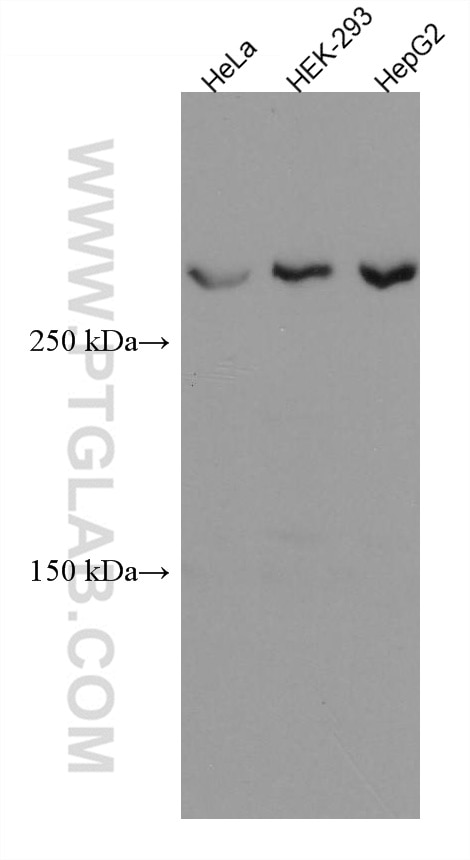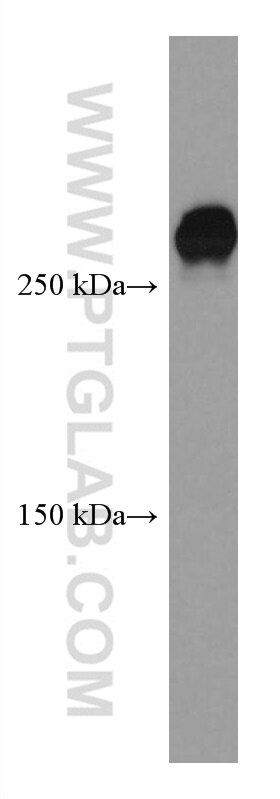ATM Monoklonaler Antikörper
ATM Monoklonal Antikörper für WB, ELISA
Wirt / Isotyp
Maus / IgG1
Getestete Reaktivität
human, Ratte und mehr (1)
Anwendung
WB, IF, ELISA
Konjugation
Unkonjugiert
CloneNo.
3E6F4
Kat-Nr. : 67586-1-Ig
Synonyme
Geprüfte Anwendungen
| Erfolgreiche Detektion in WB | HeLa-Zellen, HEK-293-Zellen, HepG2-Zellen |
Empfohlene Verdünnung
| Anwendung | Verdünnung |
|---|---|
| Western Blot (WB) | WB : 1:1000-1:5000 |
| It is recommended that this reagent should be titrated in each testing system to obtain optimal results. | |
| Sample-dependent, check data in validation data gallery | |
Veröffentlichte Anwendungen
| WB | See 4 publications below |
| IF | See 1 publications below |
Produktinformation
67586-1-Ig bindet in WB, IF, ELISA ATM und zeigt Reaktivität mit human, Ratten
| Getestete Reaktivität | human, Ratte |
| In Publikationen genannte Reaktivität | human, Hausschwein, Ratte |
| Wirt / Isotyp | Maus / IgG1 |
| Klonalität | Monoklonal |
| Typ | Antikörper |
| Immunogen | ATM fusion protein Ag30001 |
| Vollständiger Name | ataxia telangiectasia mutated |
| Beobachtetes Molekulargewicht | 310-350 kDa |
| GenBank-Zugangsnummer | BC137169 |
| Gene symbol | ATM |
| Gene ID (NCBI) | 472 |
| Konjugation | Unkonjugiert |
| Form | Liquid |
| Reinigungsmethode | Protein-G-Reinigung |
| Lagerungspuffer | PBS with 0.02% sodium azide and 50% glycerol |
| Lagerungsbedingungen | Bei -20°C lagern. Nach dem Versand ein Jahr lang stabil Aliquotieren ist bei -20oC Lagerung nicht notwendig. 20ul Größen enthalten 0,1% BSA. |
Hintergrundinformationen
The ATM protein is a member of the phosphatidylinositol 3-kinase family of proteins that respond to DNA damage by phosphorylating key substrates involved in DNA repair and/or cell cycle control. It is involved in mitogenic signal transduction, meiotic recombination, detection of DNA damage, and cell cycle control.
Protokolle
| PRODUKTSPEZIFISCHE PROTOKOLLE | |
|---|---|
| WB protocol for ATM antibody 67586-1-Ig | Protokoll herunterladen |
| STANDARD-PROTOKOLLE | |
|---|---|
| Klicken Sie hier, um unsere Standardprotokolle anzuzeigen |
Publikationen
| Species | Application | Title |
|---|---|---|
Food Chem Toxicol DON entry into the nucleus induces DNA damage, apoptosis and cycle arrest in GES-1 cells | ||
CNS Neurosci Ther Multiple sevoflurane exposures during mid-trimester induce neurotoxicity in the developing brain initiated by 15LO2-Mediated ferroptosis | ||
J Mol Med (Berl) High expression of BCAT1 sensitizes AML cells to PARP inhibitor by suppressing DNA damage response | ||
Signal Transduct Target Ther In vivo evaluation of guide-free Cas9-induced safety risks in a pig model |



